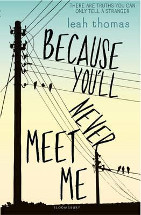Because you'll never meet me by Leah Thomas

Bloomsbury, 2015. ISBN: 9781408862629
(Age: 11+) Recommended for able readers. Themes: Disabilities;
Coming of age; Genetic experimentation; Science fiction; Friendship;
Bullying; Loneliness. In this well-written debut novel by Leah
Thomas, the two central characters write to one another to overcome
the isolation of their lives that are debilitated by unusual
physical conditions. Ollie lives a virtual electricity-free
existence with his mother, isolated from the community around him
because of his 'allergy' to all things electrical (we discover
later, that his condition influences him negatively, but that he
impacts electrical devices too). He is quirky and honest, and makes
an effort to be positive in all things; his life has always been in
this non-electric bubble - no phones, television, internet, so
effectively he is living a virtual-Amish lifestyle. Initially there
is only one visitor - a medico-scientist who links him to another
teen living in Germany, to whom he connects honestly via letters.
The German teen, Moritz, was born with no eyes and yet is able to
'see' using echo-location, he also has a Pacemaker to overcome his
cardio-myopathy. His angst and distress with his life is expressed
honestly and with some pathos as he deals with a school bully and
his social isolation. Ollie and Moritz will never meet . . . the
electricity from the pace-maker would be mutually destructive and
their differing perspectives of life are impacted by their culture
and experience, so initially the 'friendship' appears to be
completely one-sided.
When Ollie is visited by a local girl, Liz, whose friendship changes
him, he shares the impact of her life and 'spark' into his life with
Moritz. Tragedies happen for both boys, but eventually the history
of some 'experimentation' that has created their unusual physical
expressions becomes the focus of the book as Moritz reveals the
drama of their shared history.
The circumstances of this book are not realistic, but the characters
express real emotional responses to difficult circumstances, and
their normal teenage concerns will connect with a young adult
readership. Readers who enjoy John Green fiction will enjoy this
book. It has light-hearted moments, and pathos, and although the
circumstances are not real, it is easy to identify with the two
lonely and isolated teens and empathise with their pain, but also to
see that there is some hope for their future.
Carolyn Hull